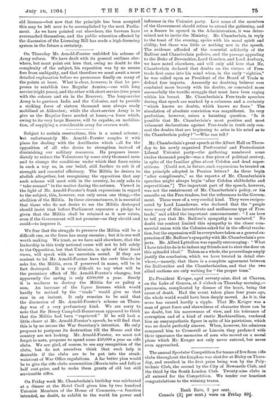influence, n the Unionist party. Lest some of the members
of the Government should refuse to attend the gathering, and so a fissure be opened in the Administration, it was deter- mined not to invite the Ministry. Mr. Chamberlain, in reply to the toast of the evening, spoke with his usual spirit and ability, but there was little or nothing new in the speech. The evidence afforded of the essential solidarity of the Balfour and Chamberlain policies, and the passage appealing to the Duke of Devonshire, Lord Goschen, and Lord Avebury, we have noted elsewhere, and will only add here that Mr. Chamberlain declared that doubts on the virtues of Free. trade first came into his mind when, in the early "eighties," he was called upon as President of the Board of Trade to defend free imports. Assuredly no doubting believer ever combated more bravely with his doubts, or concealed more successfully the terrific struggle that must have been raging within his breast. Mr. Chamberlain's Free-trade speeches during that epoch are marked by a calmness and a certainty "which knows no doubts, which knows no fears." The simulation of absolute conviction was magnificent. Its very perfection, however, raises a haunting question. "Is it possible that Mr. Chamberlain's most positive and most vehement declarations against Free-trade in truth only con- ceal the doubts that are beginning to arise in his mind as to the Chamberlain policy ? "—Who can tell ?


































 Previous page
Previous page